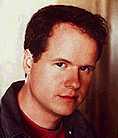June 23: Joss Whedon (1964)
 It was on this date, June 23, 1964, that third-generation TV writer and Buffy the Vampire Slayer series creator Joss Whedon was born. He grew up in Manhattan, attended film school, and got his break as a writer for the “Roseanne” TV series. But in 1997 he hit big with the popular TV series, “Buffy the Vampire Slayer,” a follow-on to the popular 1992 film. The series ran through 2003.
It was on this date, June 23, 1964, that third-generation TV writer and Buffy the Vampire Slayer series creator Joss Whedon was born. He grew up in Manhattan, attended film school, and got his break as a writer for the “Roseanne” TV series. But in 1997 he hit big with the popular TV series, “Buffy the Vampire Slayer,” a follow-on to the popular 1992 film. The series ran through 2003.
Whedon has written and/or directed for many other projects, including the “Buffy” spinoff series called “Angel” (1999-2004), the short-lived space western called “Firefly” (2002), the satirical horror film Cabin in the Woods (2012), the highly successful superhero film The Avengers (2012), the William Shakespeare comedy Much Ado About Nothing (2012) and the TV series “Agents of S.H.I.E.L.D.” (2013-) featuring the Marvel comics superheroes created by Stan Lee.
In a posting on the official “Buffy the Vampire Slayer” board, Whedon explained the religious ideas in a Christmas-themed episode of the series:
… Was it God? Well, I’m an atheist, but it’s hard to ignore the idea of a “Christmas miracle” here (though the PRAY on the marquee was an unintentional coincidence). The fact is, the Christian mythos has a powerful fascination to me, and it bleeds into my storytelling. Redemption, hope, purpose, Santa, these all are important to me, whether I believe in an afterlife or some universal structure or not. I certainly don’t mind a strictly Christian interpretation being placed on this episode by those who believe that – I just hope it’s not limited to that.
In a 2002 Onion AV Club article, entitled “Is There A God?”, Whedon was asked the question. “No,” he replied. Pressing on, The Onion asked, “That’s it, end of story, no?” Whedon said, “Absolutely not. That’s a very important and necessary thing to learn.” Talking about the exploration of religion and morality through his work, he cited his work on “Angel”:
The meaning of life and the meaning of what we do with our lives is something that’s extremely important to me. [...] One of the few times that I really got to sort of say exactly what I think about the world was in the second season of Angel. [...] [Angel] said, you know, “Well then, this is my statement. Nothing [we do] matters, so the only thing that matters is what we do.”
Furthermore, in the “Firefly” episode “Objects in Space,” Whedon said he was inspired by the existentialism of Jean-Paul Sartre’s 1938 novel Nausea, calling the atheist-existentialist philosopher’s book “the most important book” he ever read.
In a Q&A session promoting his 2005 movie Serenity, writer-director Whedon was asked: “What do you have against being a Christian?” He answered in part, “I don’t actually have anything against anybody, unless their belief precludes everybody else. I am an atheist and an absurdist and have been for many, many years. … So the answer is: ‘Nothing, unless you’ve got something against me.’”

